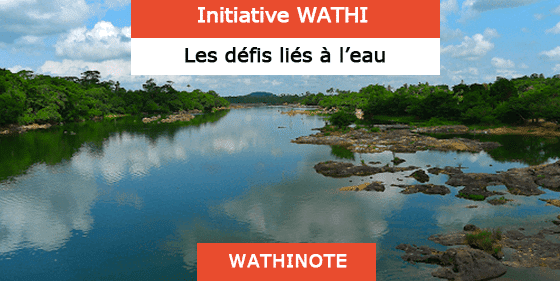

Affiliated organization: WaterAid
Site of publication: washmatters.wateraid.org
Type of publication: Advocacy brief
Date of publication: July 2021
In Burkina Faso and Niger, the climate crisis is a water crisis: In both countries, many people still depend on surface water sources, such as rivers and ponds, which are vulnerable to shocks and disasters. This situation greatly compromises key development sectors such as agriculture and puts the wellbeing of over 43 million people at risk.
What’s the problem?
According to forecasts on the impact of climate change on water resources, the water insecurity already present in both countries could intensify and threaten economic stability and human development if the countries concerned do not put in place adequate measures for water resource management such as building structures or establishing systems (for example, small dams, stone fences, tree planting) and observed safe distance between the sanitation facilities and waterpoints.
In Burkina Faso, an estimate of the ratio of usable water to the country’s needs shows that the country is in a permanent state of water stress. In 2050, water volumes will decrease significantly compared to the 1961-1990 in all the basins of Burkina Faso. In particular, there will be a drop of 68.9% in the Comoé, 73% in the Mouhoun, 29.9% in the Nakanbé and 41.4% in the Niger. These conditions call for action, in particular, for increased investment in water services.
Niger, despite its considerable water potential, has a very high-water dependency index: 89.6%. The country is totally dependent on the actions of other neighbouring states for its supply of fresh surface water. Niger is estimated to use only 20% of its total groundwater resources. Annual withdrawals to satisfy the various water needs by 2025 will evolve to more than 9.2 billion m3. They remain well below the renewable water resources estimated at more than 32.5 billion m3 annually.
Why is it important?
The availability of water resources and water supply services to abstract, treat and deliver water to households is fundamental to water security. Without water security, people, especially women and girls, are more vulnerable and less able to cope with drought, floods, disease and weather uncertainties.
In 2050, water volumes will decrease significantly compared to the 1961-1990 in all the basins of Burkina Faso
In Burkina Faso, the significant variation in rainfall from one year to the next and the increase in potential evaporation represent proven risks for the growth cycle of rainfed crops, particularly millet and sorghum.
In Niger, the Sahelian zone is at risk of early drying up of wells and cesspools, low filling of lakes, insufficient water for various uses and worsening water stress.
According to the World Bank report (2016): “water scarcity exacerbated by climate change could cause some regions to experience a decline of up to 6% in GDP, trigger migration and trigger conflicts”.
Call for urgent action to ensure water security
Water is life. If governments do not anticipate the predictable and devastating effects of climate change to secure access to water and sufficient provision it will affect many lives. African countries must ensure that water, sanitation and hygiene are included in their climate change adaptation commitments in order to achieve the Sustainable Development Goals by 2030.
In Niger, the Sahelian zone is at risk of early drying up of wells and cesspools, low filling of lakes, insufficient water for various uses and worsening water stress
WaterAid calls on the governments of Burkina Faso and Niger to:
- Include water, sanitation and hygiene in climate change policy as a key adaptation strategy and commit to incentivise better cross-institutional cooperation across departments to recognise water, sanitation and hygiene as essential elements in climate change adaptation
- Improve climate resilience and adaptive capacity to extreme water-related disasters through risk and emergency management solutions by raising community awareness about risks and strengthening integrated water resources management programs at all levels by 2030
- Prioritise the development of national funding proposals that address WASH and climate change to ensure that they meet the criteria set by funds such as the Green Climate Fund and the Adaptation Fund
Endorse innovative financing such as the Resilient Water Accelerator, which aims to build practical solutions to the water and climate crisis, support countries’ such as Niger and Burkina Faso bids to secure climate finance, and ensure that more climate finance is fast tracked towards protecting communities’ vital water services from a changing climate
Les Wathinotes sont soit des résumés de publications sélectionnées par WATHI, conformes aux résumés originaux, soit des versions modifiées des résumés originaux, soit des extraits choisis par WATHI compte tenu de leur pertinence par rapport au thème du Débat. Lorsque les publications et leurs résumés ne sont disponibles qu’en français ou en anglais, WATHI se charge de la traduction des extraits choisis dans l’autre langue. Toutes les Wathinotes renvoient aux publications originales et intégrales qui ne sont pas hébergées par le site de WATHI, et sont destinées à promouvoir la lecture de ces documents, fruit du travail de recherche d’universitaires et d’experts.
The Wathinotes are either original abstracts of publications selected by WATHI, modified original summaries or publication quotes selected for their relevance for the theme of the Debate. When publications and abstracts are only available either in French or in English, the translation is done by WATHI. All the Wathinotes link to the original and integral publications that are not hosted on the WATHI website. WATHI participates to the promotion of these documents that have been written by university professors and experts.
